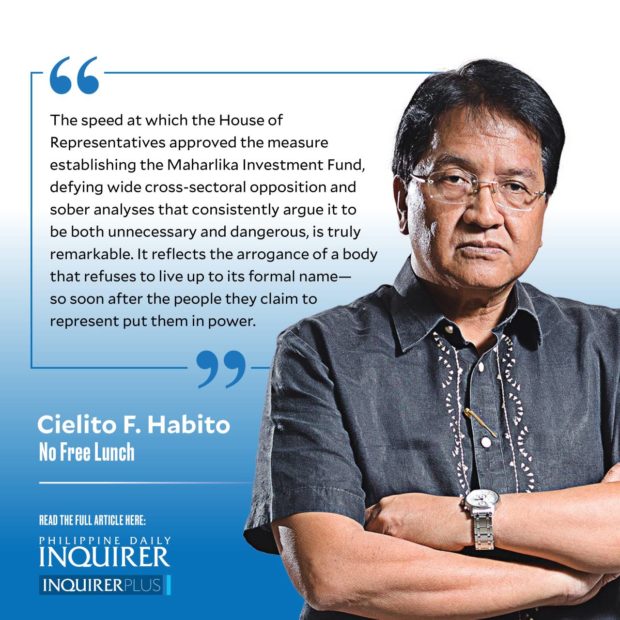More critical than Maharlika
 A colleague recently posted in our chat group: “The reproductive health (RH) bill took 10 years to pass. The bill for a National Land Use Act (NLUA) has seen many presidents come and go and still lies sleeping in Congress. Maharlika is like a genie; after only three rubs of the congressional bellies, it’s out.” The speed at which the House of Representatives approved the measure establishing the Maharlika Investment Fund, defying wide cross-sectoral opposition and sober analyses that consistently argue it to be both unnecessary and dangerous, is truly remarkable. It reflects the arrogance of a body that refuses to live up to its formal name—so soon after the people they claim to represent put them in power.
A colleague recently posted in our chat group: “The reproductive health (RH) bill took 10 years to pass. The bill for a National Land Use Act (NLUA) has seen many presidents come and go and still lies sleeping in Congress. Maharlika is like a genie; after only three rubs of the congressional bellies, it’s out.” The speed at which the House of Representatives approved the measure establishing the Maharlika Investment Fund, defying wide cross-sectoral opposition and sober analyses that consistently argue it to be both unnecessary and dangerous, is truly remarkable. It reflects the arrogance of a body that refuses to live up to its formal name—so soon after the people they claim to represent put them in power.
Like my colleague, I am unhappy with how several congresses sat on critical pieces of legislation—the RH and NLUA bills being only two of many we’ve seen. The NLUA has been languishing for nearly three decades now. It was during my watch at the National Economic and Development Authority (Neda) that heads the National Land Use Committee (NLUC), when we first proposed the NLUA bill in 1994, at the ninth Congress. I recall how my undersecretary for regional development Aniceto “Chito” Sobrepeña, then Neda’s NLUC point person, mustered the political diplomacy skills he had honed as President Cory Aquino’s Cabinet secretary, to push for the bill in Congress.
We’ve had 10 congresses since, but the closest NLUA ever got, after passage by the House, was a second reading in the Senate, in the 15th Congress in 2013. In the 16th and 17th Congresses, the bill also passed the House, but again stalled in the Senate despite successive strong pushes by Presidents Ramos, Arroyo, Aquino, and Duterte. Proponents see Sen. Cynthia Villar as the measure’s nemesis, having used her chairmanship of the committee on environment, natural resources, and climate change to keep the bill from reaching the plenary in both the 17th and 18th Congresses. That she continues to chair that same committee in the current 19th Congress dampens the hope of NLUA proponents. While she argues that the measure undermines the autonomy granted by law to local governments, they accuse her of conflict of interest given how the NLUA could restrict her family’s real estate business, which has made her husband the country’s richest man.
Why is the NLUA critical for the country? The Food and Agriculture Organization of the United Nations notes that even as the Philippine Constitution mandates state regulation of property acquisition, ownership, use, and disposition with the aim of enhancing rights and reducing inequalities, “the distribution of land in the country remains highly skewed, and its use highly politicized.” The NLUA, it asserts, would “institutionalize a holistic, rational and comprehensive land use and physical planning mechanism, which will appropriately identify land use and allocation patterns in all parts of the country … (it) would also provide for an environment that would better foster food security.” Moreover, “the NLUA would also harmonize present policies on land use, to address competing uses of land and balance the country’s needs for food, settlements, biodiversity, climate resilience, and industry.”
On the argument that the NLUA violates the autonomy that the 1991 Local Government Code grants local government units (LGUs), proponents point out that LGU powers need not be impaired, but must be guided and limited by national policy and standards. Cynics claim that the real estate industry has persistently lobbied against the NLUA as they would rather see LGUs having complete discretion on land use because “mas madali silang kausap (they are easier to talk to).” And with two members of the family of the country’s richest real estate magnate firmly ensconced in the Philippine Senate, it’s hard to be optimistic about the NLUA finally becoming law.
Call it wishful thinking, but there are those who hope that the Villars would prove their accusers wrong by yielding to the long-standing and convincing arguments, from both domestic and foreign analysts, that enacting the NLUA is critical to the Filipinos’ future.
cielito.habito@gmail.com




















